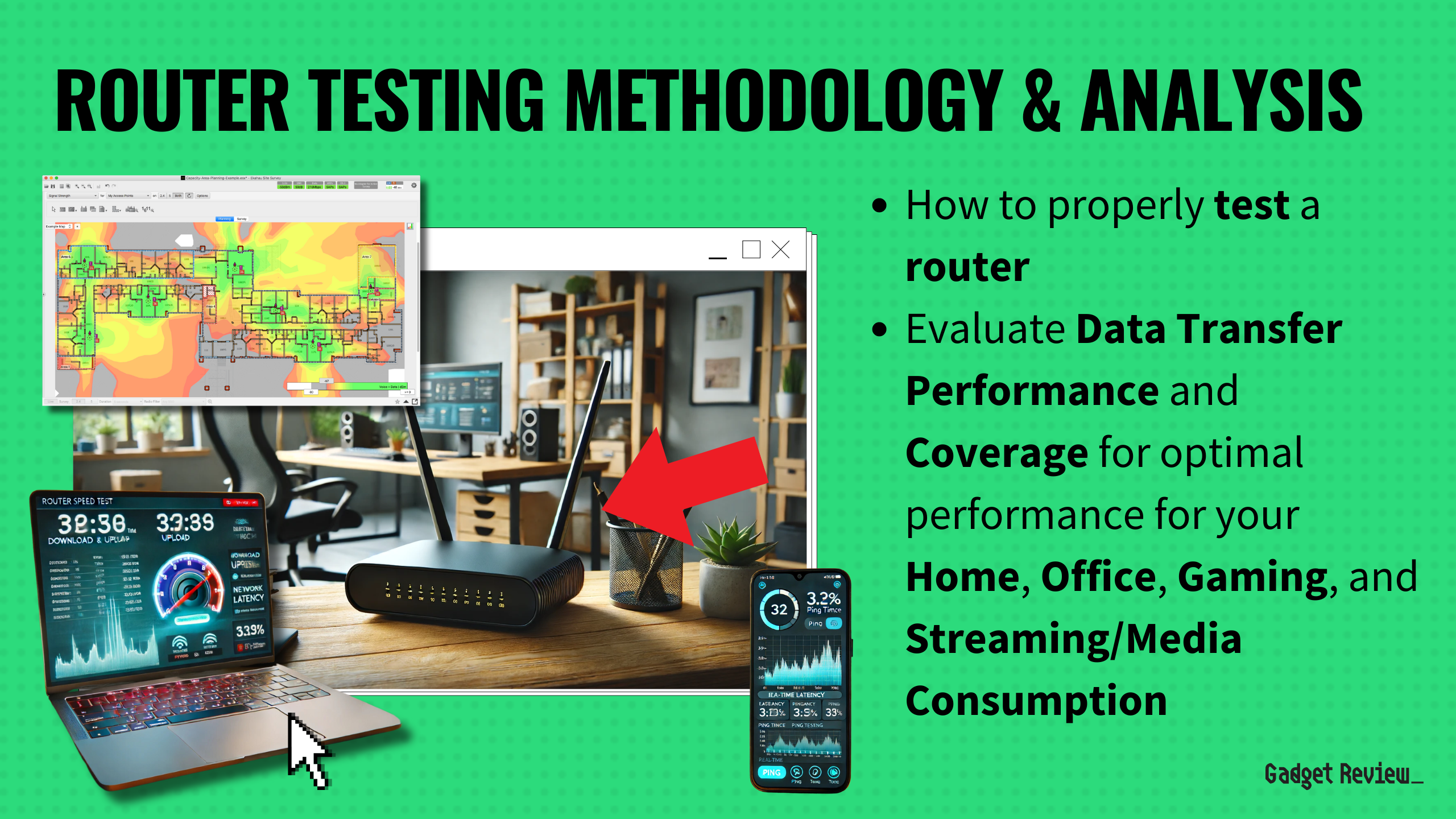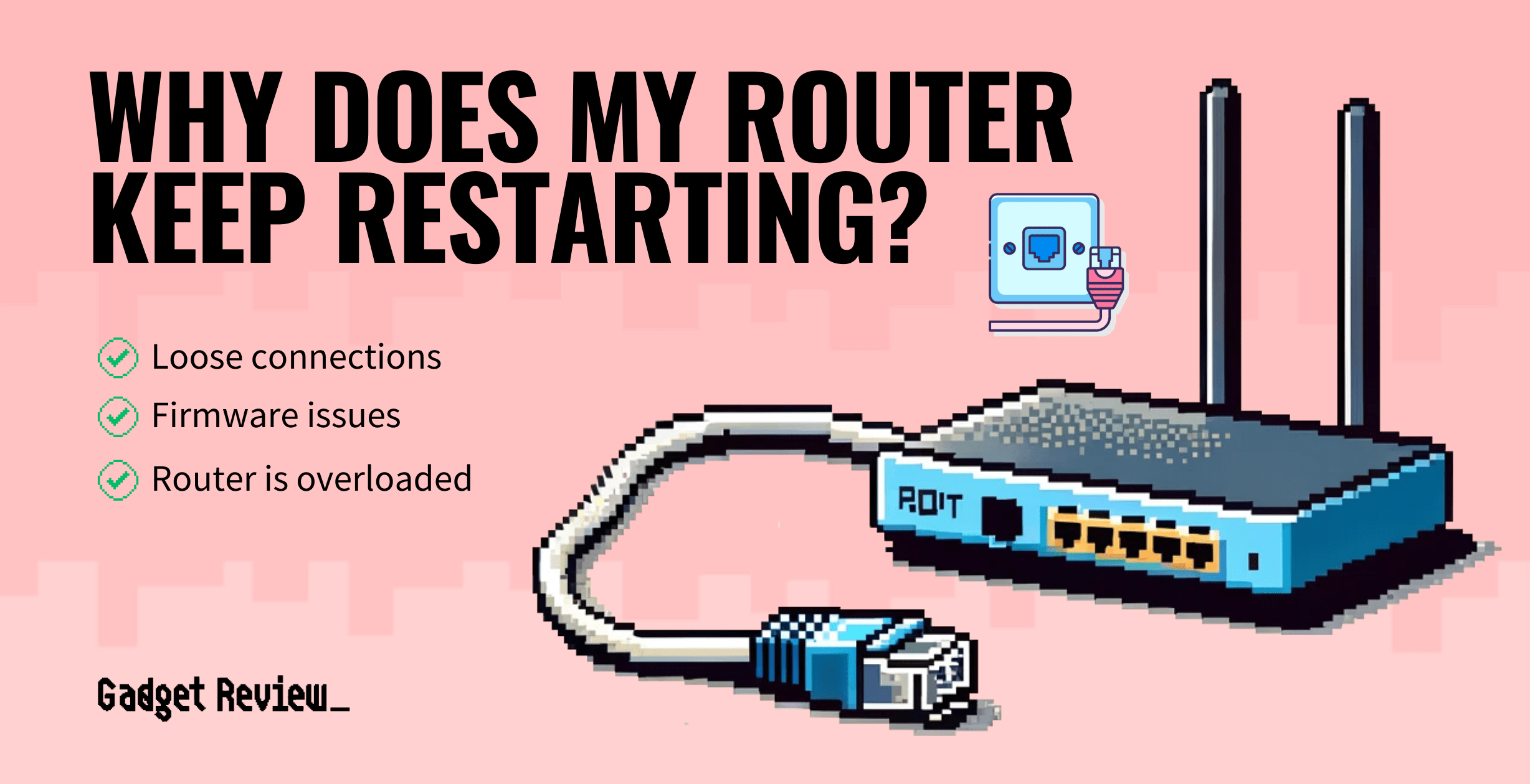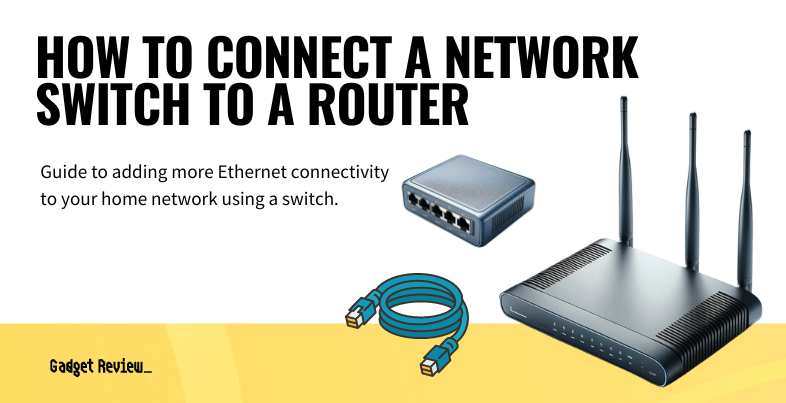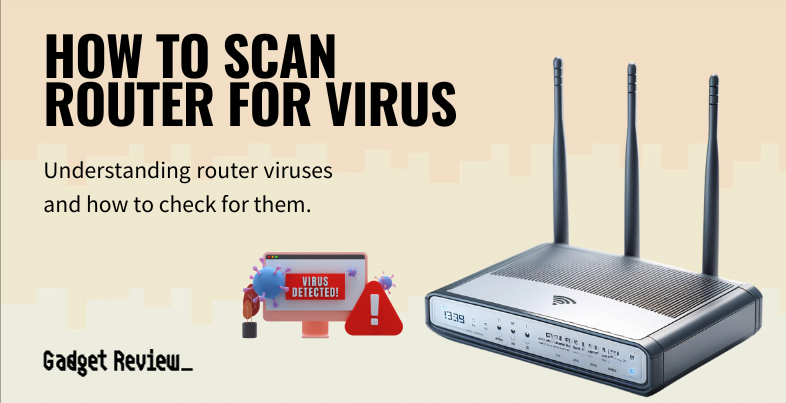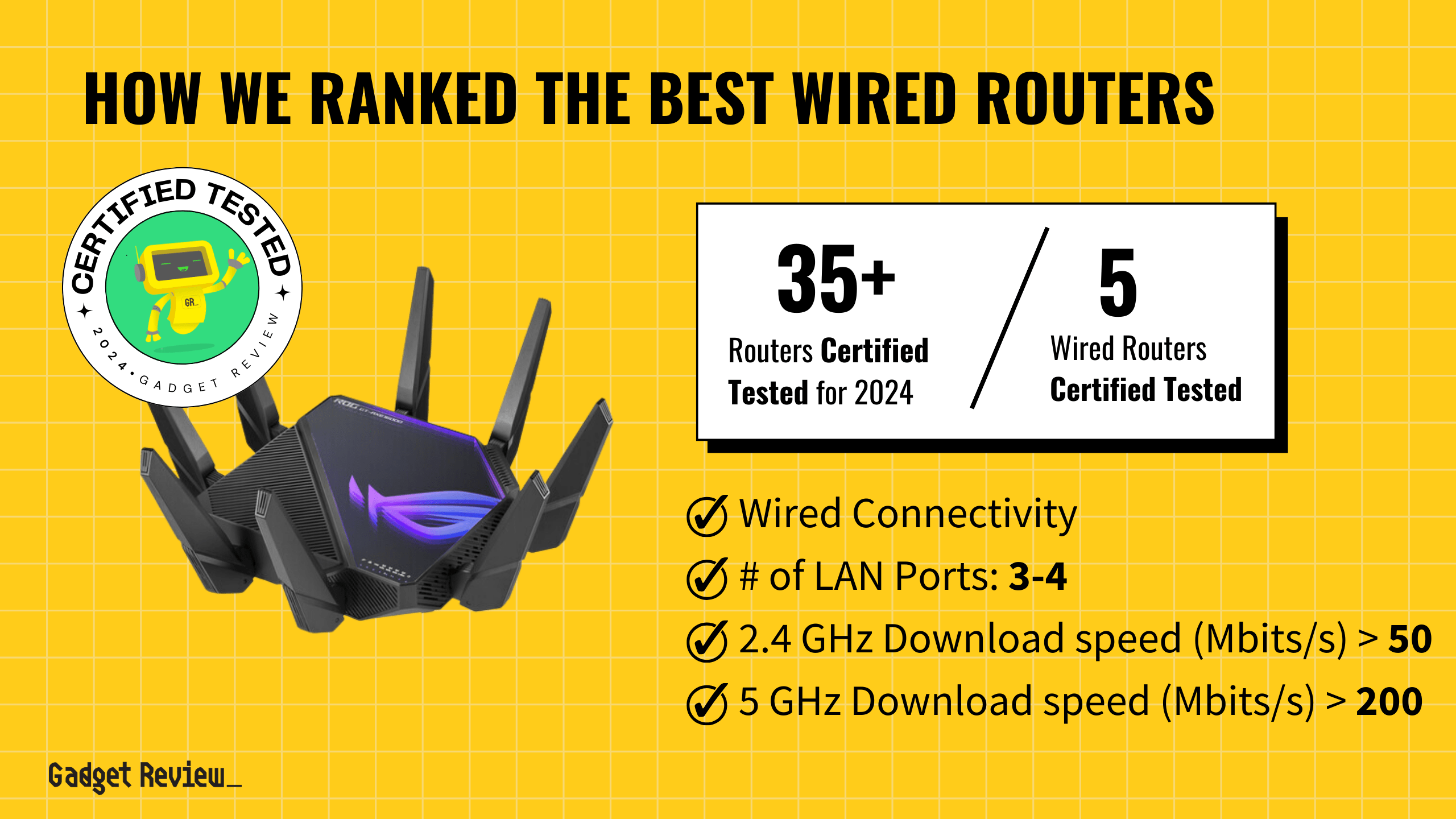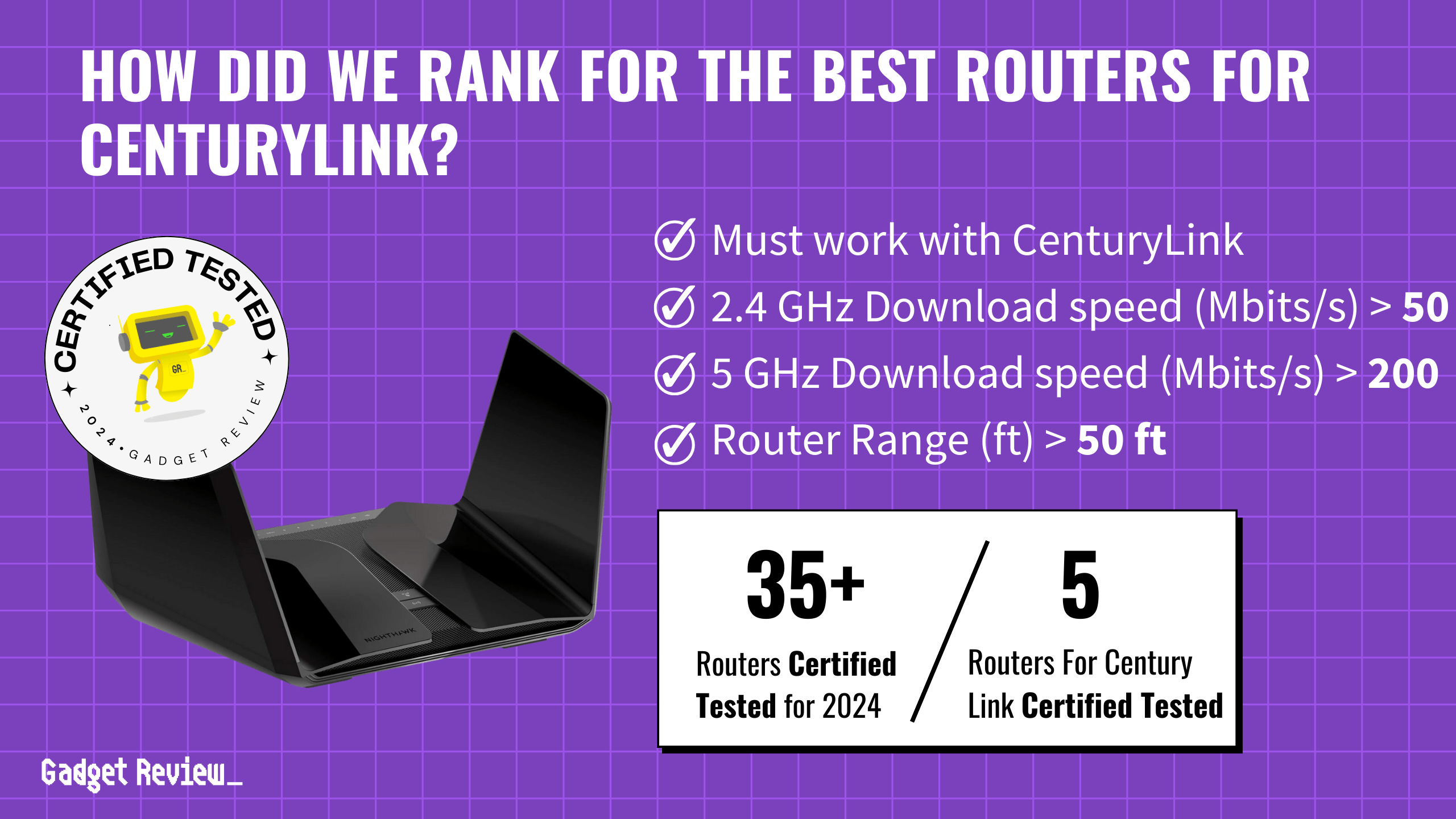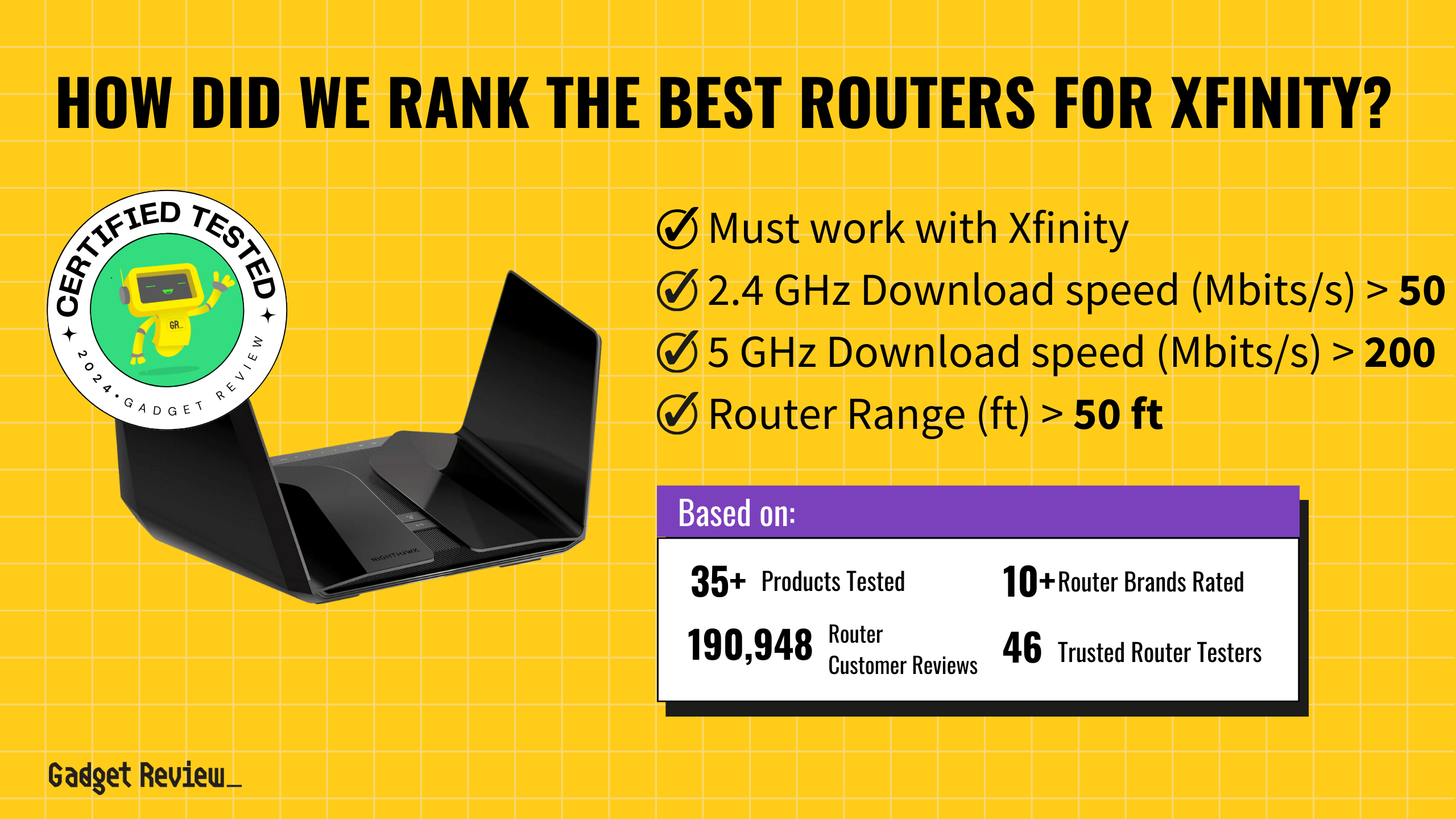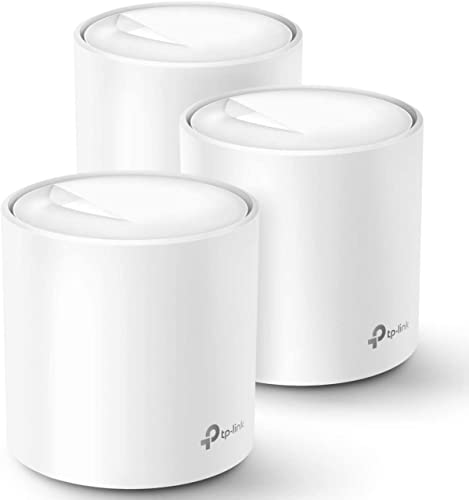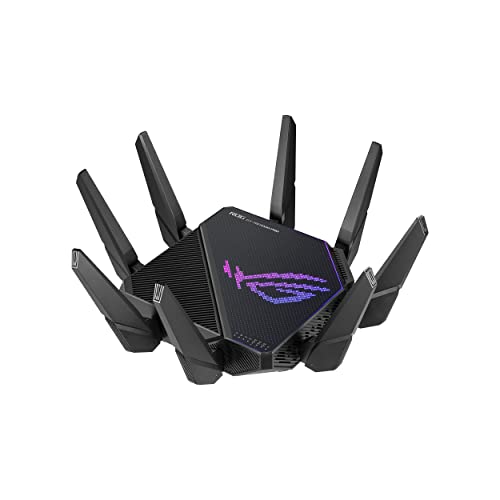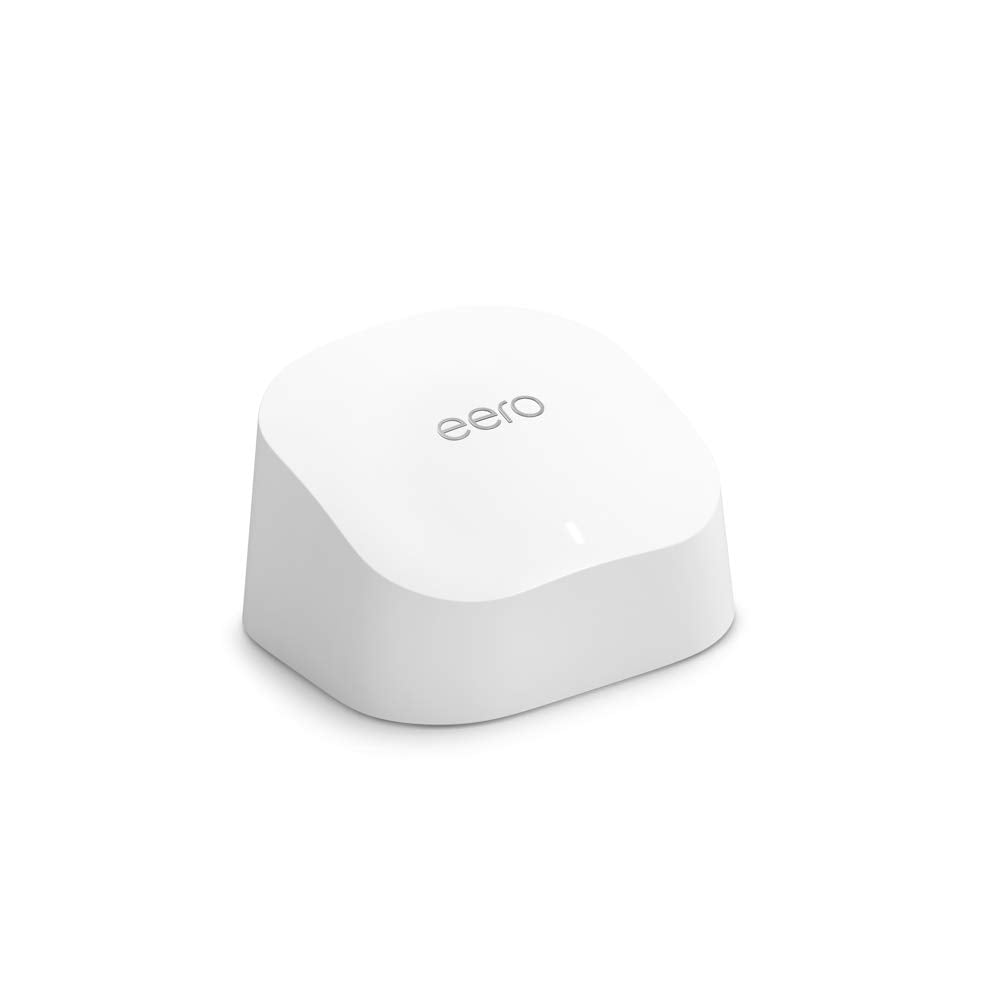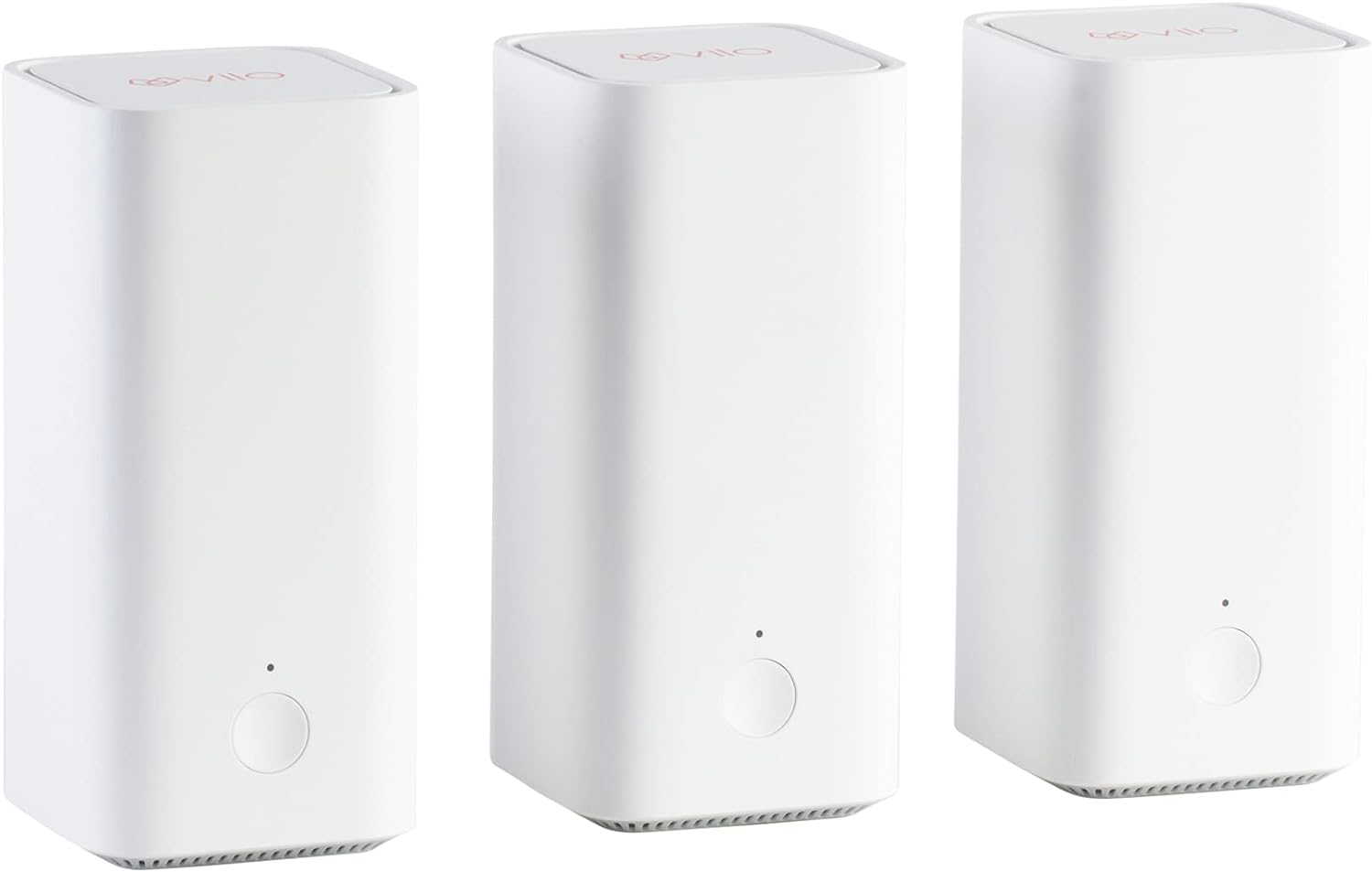Sadly, the farther you are from your router, the weaker your internet gets. A Mesh Wi-Fi router will solve this issue by making sure your Wi-Fi signal reaches every corner of your house. Problem solved! We evaluated 43 routers, certified 5 as tested and analyzed 194,424 reviews to ensure our recommendations are based on reliable data.
Our unique approach filters out fake and low-quality reviews, ensuring only trustworthy insights contribute to our guide. We used our scientifically proven True Score to identify top-performing products, ensuring these models were certified as tested. The winning mesh routers impressed with their performance, range, and ease of use, making them excellent routers for maintaining a stable and fast network across your home or office.
How Did We Rank the Best Mesh Routers?
Determining the best mesh routers involves a meticulous examination of diverse sources. We analyzed testing methodologies, expert opinions, and customer reviews from more than 200 sites. This extensive research allowed us to identify the crucial 2 required test results, 2 nice-to-have features, and 1 must-have specification that define top-tier mesh routers. Our goal is to provide a clear, concise buying guide based on robust data, ensuring you can choose the best router to meet your needs without any guesswork.
Our commitment to unbiased reviews is powered by our ‘True Score’ system, targeting low quality and fake reviews. When you shop through our links, you’re backing our mission. Dive deeper to see how.
?️ Minimum Specifications
- Must have a mesh system.
? Test Criteria
- 2.4 GHz Download Speed: A download speed on the 2.4 GHz band of at least 50 Mbits
- 5 GHz Download Speed: A download speed on the 5 GHz band of at least 200 Mbits.
? “Nice To Haves”
- Router Range: A range of at least 50 feet before the signal from the router begins to become noticeably weaker.
- Latency: A latency of 30 ms or less.
Latest Updates
- 06/16/2024: Republished the list to include the best mesh routers based on our True Score system.
Top Mesh Routers For 2025
Prices accurate at the time of publishing

Best Overall

Runner Up

Best Value

Best Budget

Best Mid-Range

Premium Pick
Synology WRX560
Best For Vpn
A solid router for mesh networks, excelling in stable 2.4 and 5 GHz performance. Limited by no 6 GHz support and being just one mesh component.
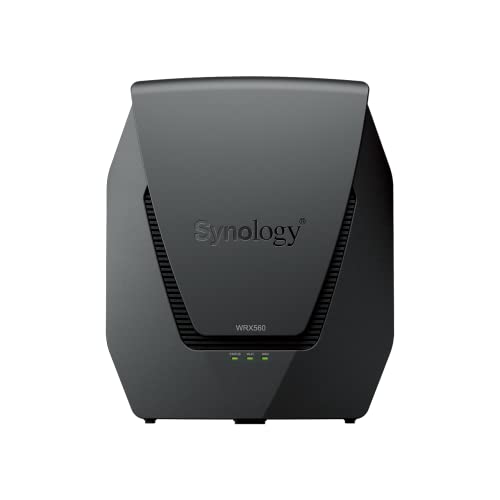
True Score
86886Experts
914kCustomers
Absolutely Fresh
 $219.99
$219.99Read More
Snapshot
Reasons to Buy
- Fast transfer speeds
- Range & Coverage
- Ease of use
Reasons to Avoid
- No USB port for external connectivity
Specifications

# of LAN Ports 3 
Frequency Bands 2.4 GHz, 5.0 GHz 
MU-MIMO Support Yes 
Wireless Standard AX 
Mesh System Yes 
Quality of Service Prioritization Yes 
# of Phone Ports n/a 
# of WAN Ports 1 
App Compatible Yes 
Available Storage n/a 
Band Technology Dual 
Data Encryption Type WPA3 
Energy Star Certified n/a 
Integrated Modem No 
LAN Ports – 
Number of Antennas 6 
Parental Controls Yes 
Processor Cores Quad 
Processor Speed 1.4 GHz 
WiFi Range 5400 sq. ft 
WiFi Speed 3 Gb 
Wired Speed 1000 Mb All Specs
Test Results
2.4 GHz Download speed (Mbits/s) 120 5 GHz Download speed (Mbits/s) 640 6 Ghz Download speed (Mbits/s) 0 Latency (ms) 0 Router Range (ft) 0 2.4 GHz Upload speed (Mbits/s) 97 5 GHz Upload speed (Mbits/s) 635 6 Ghz Upload speed (Mbits/s) 0 All Tests
All Retailers
- $219.99
- $219.99
- $236.99
Our Verdict
The Synology WRX560 is a reliable router for setting up a mesh network, designed to provide consistent and stable Wi-Fi coverage across your home. With a 2.4 GHz download speed of 120.42 Mbits/s (and an upload of 96.6 Mbits/s), it can easily support everyday activities like web browsing and streaming. On the 5 GHz band, the WRX560 offers a download speed of 640.4 Mbits/s (and a best-in-class upload speed of 634.5 Mbits/s), making it adept at handling more bandwidth-intensive tasks such as 4K streaming and online gaming as well as personally streaming on streaming services like Twitch.
The WRX560 is limited, however: it doesn’t support the 6 GHz band. If you’re looking for a future-proofed router, the lack of 6 GHz support means you won’t be able to take advantage of it until you change routers. Additionally, the WRX560 is just one router – it isn’t a full mesh network, but instead is a piece of one. You can set up a mesh network using additional routers, nodes, and repeaters to create a unified “single network” despite using multiple access points, but this will require additional investment or an already existing set of repeaters and routers.
With additional features like quality of service prioritization to manage device traffic effectively and MU-MIMO support to handle multiple devices simultaneously, the WRX560 can easily create a robust and efficient mesh network for a wide range of use cases, from streaming to gaming in a small business. It’s held back by its lack of support for the 6 GHz band and the fact it’s just one piece of the mesh network, but it provides outstanding performance as both a standalone and a piece of the network, and it’s priced attractively enough to be a great “centerpiece” in the mesh.
Read Less

Best Overall

Runner Up

Best Value

Best Budget

Best Mid-Range

Premium Pick
Asus ROG GT6 Mesh
Best For Streaming
A high-speed, gaming-focused mesh network with excellent 2.4 GHz and 5 GHz performance. It lacks a 6 GHz band but offers extensive coverage and advanced features for gamers.

True Score
80826Experts
854kCustomers
Absolutely Fresh
 SAVE $80$479.99$399.99
SAVE $80$479.99$399.99Read More
Snapshot
Reasons to Buy
- Fast Download/Upload Speed
- Easy to install and operate
Reasons to Avoid
- WiFi speed drops off at long range
- Connection range is limited
- Limited USB Connectivity
- Mediocre Latency
Specifications

# of LAN Ports 3 
Frequency Bands 2.4 GHz, 5.0 GHz 
MU-MIMO Support Yes 
Wireless Standard AC, AX, N 
Mesh System Yes 
Quality of Service Prioritization Yes 
# of Phone Ports n/a 
# of WAN Ports 1 
App Compatible Yes 
Available Storage 256MB 
Band Technology Tri 
Data Encryption Type WEP, WPA-Enterprise, WPA-PSK, WPA2-Enterprise, WPA3-Personal 
Energy Star Certified No 
Integrated Modem No 
LAN Ports 3 Gb Ethernet 
Number of Antennas 9 
Parental Controls Yes 
Processor Cores Triple 
Processor Speed 1.7GHz 
WiFi Range 5800 sq. ft 
WiFi Speed 2.6 Gb 
Wired Speed 2500 Mb All Specs
Test Results
2.4 GHz Download speed (Mbits/s) 139 5 GHz Download speed (Mbits/s) 701 6 Ghz Download speed (Mbits/s) 0 Latency (ms) 22 Router Range (ft) 95 2.4 GHz Upload speed (Mbits/s) 112 5 GHz Upload speed (Mbits/s) 619 6 Ghz Upload speed (Mbits/s) 0 All Tests
All Retailers
- $399.99$480Save $80
- $399.99$480Save $80
Our Verdict
If you’re looking for a more gaming-focused mesh network that doesn’t require additional purchases, the Asus ROG GT6 Mesh delivers high-speed and reliable Wi-Fi coverage across extensive areas. Its performance on the longer-ranged, more stable 2.4 GHz band includes a download speed of 139.35 Mbits/s and an upload speed of 111.9 Mbits/s, which ensures robust connectivity for daily internet activities like browsing and streaming across multiple devices, smooth uploads, or streaming lower-resolution video through programs like OBS or Discord.
Regarding the 5 GHz frequency, the GT6 Mesh impresses with a download speed of 701.3 Mbits/s. This is particularly beneficial in a mesh network where the demand for bandwidth increases with high-definition video streaming, gaming, and other data-intensive tasks and helps cut down on lag and buffering. Plus, with its upload speed of 618 Mbits/s, it can handle high-quality streaming on platforms like Twitch without dropping frames or losing quality.
The router’s lack of a 6 GHz band does hurt it, as it means you’re not future-proofed; if you need 6 GHz as part of your mesh network, you’d be better served with the Eero Max 7, though it’s also more expensive.
With a range of 95 feet and a latency of 22 ms, the GT6 can offer extensive coverage and responsive internet access across a mesh network. This is significant for ensuring that every corner of your space is well-served, minimizing dead zones and latency spikes.
With useful features like QoS and MU-MIMO tech, the Asus ROG GT6 Mesh is an excellent good-to-go mesh option that won’t need extra purchases to get your network started (though you only get 2 access points in the box.) While the lack of 6 GHz is a letdown, it still combines advanced networking features with impressive speed and coverage capabilities, ensuring that users enjoy a premium online experience across their entire home or gaming environment.
Read Less

Best Overall

Runner Up

Best Value

Best Budget

Best Mid-Range

Premium Pick
TP-Link Archer AXE75
Best For Parental Controls
Budget-friendly, solid performance across all bands, including 6 GHz. Ideal as a mesh network starting point, requiring additional devices for full coverage.
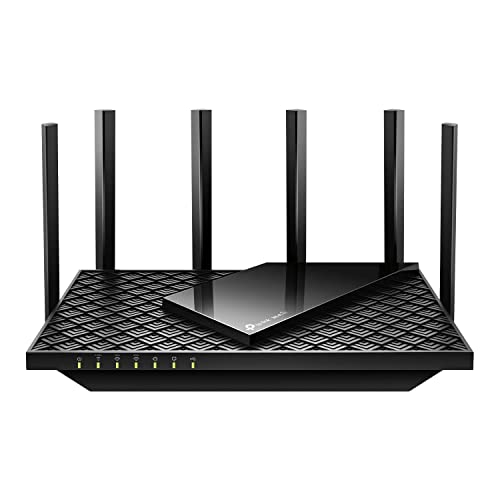
True Score
79794Experts
862kCustomers
Mixed Reviews
 SAVE $70$199.99$129.99
SAVE $70$199.99$129.99Read More
Snapshot
Reasons to Buy
- Good WiFi speeds
- Adequate range
- Simple set up
Reasons to Avoid
- Average download speeds
- Limited coverage
- Subscription-based security solutions
Specifications

# of LAN Ports 4 
Frequency Bands 2.4 GHz, 5.0 GHz, 6.0 GHz 
MU-MIMO Support Yes 
Wireless Standard AC, AX 
Mesh System Yes 
Quality of Service Prioritization Yes 
# of Phone Ports n/a 
# of WAN Ports 1 
App Compatible Yes 
Available Storage n/a 
Band Technology Tri 
Data Encryption Type WPA3 
Energy Star Certified n/a 
Integrated Modem No 
LAN Ports Gigabit Ethernet 
Number of Antennas 6 
Parental Controls Yes 
Processor Cores Triple 
Processor Speed 1.7GHz 
WiFi Range 2500 sq.ft 
WiFi Speed 2.4GHz 
Wired Speed 1000 Mb All Specs
Test Results
2.4 GHz Download speed (Mbits/s) 65 5 GHz Download speed (Mbits/s) 309 6 Ghz Download speed (Mbits/s) 318 Latency (ms) 9 Router Range (ft) 60 2.4 GHz Upload speed (Mbits/s) 0 5 GHz Upload speed (Mbits/s) 0 6 Ghz Upload speed (Mbits/s) 0 All Tests
All Retailers
- $129.99$200Save $70
- $149.99$180Save $30
- $159.00
Our Verdict
If you’re on a budget, the TP-Link Archer AXE75 is a great router for mesh networks that hits the right blend of performance and affordability. With a 2.4 GHz download speed of 65.05 Mbits/s, it’s fast enough for standard internet needs, like smooth web browsing and streaming across your mesh network. In the 5 GHz band, the Archer AXE75 provides a download speed of 309.1 Mbits/s, which is plenty for more demanding internet activities, including HD streaming and online gaming.
Despite the budget pricing, the router also supports the 6 GHz band, offering a download speed of 317.9 Mbits/s. The fact this router includes this helps give the router some longevity and means you can use it for longer than routers that don’t support it. However, with a range of 60 feet and a latency of 9 ms, the Archer AXE75 might not cover as large an area or offer the lowest latency compared to some competitors.
The AXE75 is also just a single router, it’s not a complete mesh network – just mesh-ready. You’ll need more routers, repeaters, or access points to get your mesh network going. If you’re looking for a mesh network right out of the box, consider the ROG GT6; it’s more expensive up front, but you get two access points. Fortunately, features like MU-MIMO support and quality of service (QoS) prioritization ensure efficient mesh network management once it is set up.
The TP-Link Archer AXE75 is a solid budget choice with good performance across all three bands. While you’ll need to buy more devices for your mesh, it’s a great starting point, and you can use the money saved towards more satellites or a second AXE75.
Read Less

Best Overall

Runner Up

Best Value

Best Budget

Best Mid-Range

Premium Pick
Eero Max 7
A premium mesh solution with superior 5 GHz and exclusive 6 GHz band performance, it offers extensive coverage and ultra-low latency and is future-proof, ideal for high-demand users.
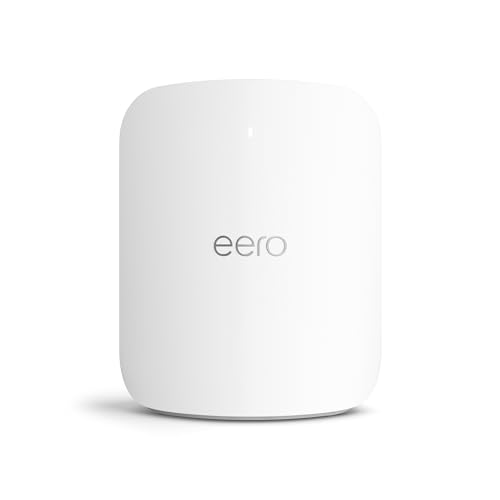
True Score
79797Experts
85314Customers
Mixed Reviews
 SAVE $120$599.99$479.99
SAVE $120$599.99$479.99Read More
Snapshot
Reasons to Buy
- Exceptional Download WiFi Speed
- Easy Installation and Configuration
- Low Latency
Reasons to Avoid
- Poor 2.4 GHz Upload Speeds
- Short Range of Coverage
- Limited Port Space
Specifications

# of LAN Ports 4 
Frequency Bands 2.4 GHz, 5.0 GHz, 6.0 GHz 
MU-MIMO Support Yes 
Wireless Standard BE 
Mesh System Yes 
Quality of Service Prioritization No 
# of Phone Ports n/a 
# of WAN Ports 1 
App Compatible Yes 
Available Storage 4000MB 
Band Technology Tri 
Data Encryption Type WPA2-Personal, WPA3-Personal 
Energy Star Certified No 
Integrated Modem No 
LAN Ports 2 Gb Ethernet 
Number of Antennas 10 
Parental Controls Yes 
Processor Cores Quad 
Processor Speed – 
WiFi Range 2500 sq.ft 
WiFi Speed 4.3 Gb 
Wired Speed 10000 Mb All Specs
Test Results
2.4 GHz Download speed (Mbits/s) 96 5 GHz Download speed (Mbits/s) 1,078 6 Ghz Download speed (Mbits/s) 1,223 Latency (ms) 7 Router Range (ft) 90 2.4 GHz Upload speed (Mbits/s) 75 5 GHz Upload speed (Mbits/s) 411 6 Ghz Upload speed (Mbits/s) 638 All Tests
All Retailers
- $479.99$600Save $120
- $479.99$600Save $120
- $479.99$600Save $120
Our Verdict
If you’re after a premium mesh solution, don’t mind the price tag that comes with it. The Eero Max 7 is designed for ease of setup and expansion. With a 2.4 GHz download speed of 95.90 Mbits/s, it provides a stable connection for everyday use, such as browsing and streaming, essential for a seamless mesh network experience. The 74.8 Mbits/s upload is also good for light uploading, such as low-quality streaming on services like Discord.
The Eero Max 7 excels in its unparalleled performance in the 5 GHz band, boasting a download speed of 1078.5 Mbits/s and an upload speed of 410.6 Mbits/s. This speed supports bandwidth-intensive activities like 4K video streaming and online gaming, ensuring a lag-free experience throughout your home. Additionally, the inclusion of the 6 GHz band, with a download speed of 1222.5 Mbits/s and upload speed of 638 Mbits/s, means the Eero Max 7 is a future-proof choice, with access to truly absurd speeds that let you take full advantage of fiber connections.
With a coverage range of 90 feet and an ultra-low latency of 7 ms, the Eero Max 7 ensures extensive reach and responsive internet access, critical for real-time applications and large homes. With QoS, MU-MIMO support, and a setup process designed to be as easy and painless as possible, it’s perfectly suited for a high-performance mesh network, prioritizing critical traffic and securing your online activities.
The Eero Max 7 is a powerful option for users seeking a mesh network router that combines ease of use, high-speed connectivity, extensive coverage, and advanced networking features. If you’ve got a ton of devices that need to be connected to your network or are looking for unmatched speeds, the premium price tag of the Max 7 is more than justified.
Read Less

Best Overall

Runner Up

Best Value

Best Budget

Best Mid-Range

Premium Pick
Eero Pro 6E
Offers excellent 2.4, 5, and 6 GHz performance in an easily expandable mesh network at an attractive price, making it a flexible and future-proof choice.
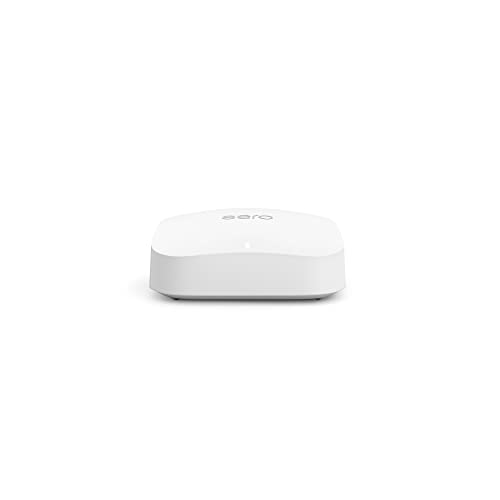
True Score
797812Experts
856kCustomers
Mixed Reviews
 SAVE $65$249.99$184.99
SAVE $65$249.99$184.99Read More
Snapshot
Reasons to Buy
- Good throughput speeds
- Good coverage
- Good smart device support
Reasons to Avoid
- Lacks included security and parental control features
- Not as consistent as some WiFi 6E routers
- Limited wired connectivity
Specifications

# of LAN Ports 1 
Frequency Bands 2.4 GHz, 5.0 GHz, 6.0 GHz 
MU-MIMO Support Yes 
Wireless Standard AC, AX, N 
Mesh System Yes 
Quality of Service Prioritization n/a 
# of Phone Ports n/a 
# of WAN Ports 1 
App Compatible Yes 
Available Storage 4000MB 
Band Technology Tri 
Data Encryption Type WPA2-PSK, WPA3-Personal 
Energy Star Certified No 
Integrated Modem No 
LAN Ports 1 Gb Ethernet 
Number of Antennas 7 
Parental Controls Yes 
Processor Cores Dual 
Processor Speed 1Ghz 
WiFi Range 6000 sq. ft 
WiFi Speed 1.6 Gb 
Wired Speed 2300 Mb All Specs
Test Results
2.4 GHz Download speed (Mbits/s) 215 5 GHz Download speed (Mbits/s) 547 6 Ghz Download speed (Mbits/s) 777 Latency (ms) 0 Router Range (ft) 85 2.4 GHz Upload speed (Mbits/s) 0 5 GHz Upload speed (Mbits/s) 111 6 Ghz Upload speed (Mbits/s) 0 All Tests
All Retailers
- $184.99$250Save $65
- $184.99$250Save $65
- $184.99$250Save $65
Our Verdict
The Eero Pro 6E is an excellent, easily expandable mesh network that offers excellent performance at an attractive price. It delivers a solid 2.4 GHz download speed of 214.83 Mbits/s, great for everyday tasks like web browsing and video streaming. In the 5 GHz range, it delivers a download speed of 547.0 Mbits/s, which is plenty for more bandwidth-intensive applications like high-definition content streaming and competitive online gaming.
The Eero Pro 6E also supports the 6 GHz band, offering a download speed of 777.4 Mbits/s. This is excellent for future-proofing your mesh network and allows you to “have room” for a burgeoning demand for bandwidth as you connect more devices to your network and internet speeds increase. The Pro 6E is also excellently priced—for the cost of less than a single Eero Max 7, you can have three Pro 6Es, which will cover most homes and then some.
Features like Quality of Service (QoS) prioritization, MU-MIMO support, and comprehensive data encryption make it an excellent, flexible option. Plus, the setup process is streamlined to be straightforward.
Between its wide coverage, performance, and surprising affordability, the Eero Pro 6E is an excellent option for users aiming to build or upgrade a mesh network with minimal fuss. It offers impressive speeds across all Wi-Fi bands, ensuring high-quality connectivity and the capability to support a wide range of online activities throughout your home, no matter how large it is.
Read Less
Which Criteria Matters for Testing Best Mesh Routers?
By focusing on these criteria (2 required, 2 nice to have), anyone can quickly and easily compare these routers and how they’ll perform. This helps you make an informed decision and purchase a routers that will meet your needs.
| CRITERIA | RANGE | REQUIRED | DEFINITION |
|---|---|---|---|
| 2.4 GHz Download Speed | > 50 Mbits/s | Yes | The maximum speed that the router can reach when downloading on the 2.4 GHz band. |
| 5 GHz Download Speed | > 200 Mbits/s | Yes | The maximum speed that the router can reach when downloading on the 5 GHz band. |
| Router Range | > 50 ft | No (Nice to have) | How far a device can be from a router before the signal starts degrading. It is worth noting that 2.4 GHz reaches further than 5 GHz. |
| Latency | < 30 ms | No (Nice to have) | The delay that is created by a signal being sent by the router and then received. |
Our Trusted Data Sources
We looked at 120+ router reviewers and found that 46 are trustworthy (60%+ Trust Rating). The three we have listed below are our most trusted for routers.
- James Morris – Kit Guru, LinkedIn
- Matt Spencer – TechGearLab, LinkedIn
- Brian Nadel – Tom’s Guide, MuckRack
Interested in a comprehensive analysis of our data sources? We’ve got you covered. Below, you’ll find a detailed list of every router review website we’ve identified, organized by their respective Trust Ratings from highest to lowest. But we didn’t stop there. We’ve meticulously reviewed each publication and verified the data by checking whether the authors have bio links to MuckRack or LinkedIn. We’re committed to not only checking the facts but ensuring their veracity.
Router Test Data & Results
Disclaimer:
Evaluating router performance is more than hardware analysis. While hardware tests are straightforward, the challenge lies in contextualizing the results within the limits of real-world usage. Routers operate under conditions that testers cannot fully standardize, including variations in Internet Service Providers (ISPs), network traffic congestion, discrepancies between advertised and actual internet speeds, and the physical layout of homes. These factors introduce a degree of unpredictability, making it hard to draw universal conclusions. As such, our router recommendations aim to provide useful general guidance, accommodating a wide range of home environments and internet setups.
1. 2.4 GHz Download Speed (Mbits/s)
The oldest and slowest of the bands on a router is the 2.4 GHz band, but it sticks around for a reason. Generally speaking, while this band features the slowest available speeds and has the lowest bandwidth, but also reaches out the furthest. It’s not the best band to connect to connect if you need high speeds, but if you just need to be connected for light browsing or anything that’s low bandwidth, it works. Alternatively, if you own a lot of old devices, this band may be the only band they can “see” and therefore, use.
Given the age of the band, top speeds on 2.4 GHz cap out very quickly. We recommend a speed of at least 50 Mbits/s, but if you aren’t really going to be using this band for anything other than checking web pages, you can go lower. It’s worth noting, though, that this might lead to a more frustrating and laggier time on modern sites with lots of scripting and high-quality images.
2.4 GHz Download Speed
> 50 Mbits/s
Acceptable range of performance
Definition: The top speed the router reaches downloading on the 2.4 GHz band.
Units of Measurement: Mbits/s (megabits per second)
Tools to Measure: Speed-checking software
Why It’s Important:
For older devices or for connecting at a longer range, the 2.4 GHz frequency is the only one that you’ll be able to use, so it should have usable speed.
2.4 GHz Download Speed (Mbits/s; higher is better; 0 = No Data)
2. 5 GHz Download Speed (Mbits/s)
The much faster 5 GHz band offers up much greater bandwidth and is much, much better at meeting high-speed demands. Streaming high-quality video, using streaming services, gaming, downloading large files and games – the 5 GHz band is what makes all of these activities quick and bearable. It reaches a lower range than the 2.4 GHz band, but it’s also much faster, so you’ll use it more, especially on newer devices that actually support the band.
Given how much you’ll be using this band, we recommend a speed of at least 200 Mbits/s to ensure you’re able to enjoy streaming and gaming on at least a few devices simultaneously. Any lower and you start to run into real bottleneck concerns, such as endless buffering, lagging, or drops in connection.
5 GHz Download Speed
> 200 Mbits/s
Acceptable range of performance
Definition: The top speed the router reaches downloading on the 5 GHz band.
Units of Measurement: Mbits/s (megabits per second)
Tools to Measure: Speed-checking software
Why It’s Important:
This band is used by most modern devices and offers greater speeds that enable activities like gaming and HD streaming on multiple devices.
5 GHz Download Speed (Mbits/s; higher is better; 0 = No Data)
3. Router Range (ft)
Router range is exactly what the name suggests: how far can you get from the router before you start experiencing issues with your connection? The complicating factor is the simple fact that range depends on the band you’re using. 2.4 GHz is a band that offers greater range, so it gives tests results that show a greater range than tests that use the 5 GHz band. In general, our research found most publications used the 5 GHz band, so our recommendations are based on that.
As such, we recommend your router have a range of at least 50 ft. This gives you a good “bubble” around the router that you can connect to, but it’s important to know that things like the walls in your home can cause issues. Thicker walls block more signal, thinner walls block less. Some materials will also do a better job than others will at stopping signal, so if you see a router with a range of 65 ft, know that it might not reach that far in your home. It could reach further – or not nearly as far. This is also why you get dead zones in your home – it’s a matter of geometry and materials.
Router Range
> 50 ft
Acceptable range of performance
Definition: The distance the router transmits reliable signal out to before performance and speed degrades.
Units of Measurement: Feet (ft)
Tools to Measure: Measuring Tape
Why It’s Important:
Range impacts how far you’ll get a reliable connection in your home, and whether you’ll need extenders or not.
Router Range (ft; higher is better; 0 = No Data)
4. Latency (ms)
Latency
< 30 ms
Acceptable range of performance
Definition: The time it takes for the router to send and then receive signals.
Units of Measurement: Milliseconds (ms)
Tools to Measure: Speed-checking software
Why It’s Important:
Latency is important to reduce delay when gaming and video conferencing.
On a router, latency refers to how long it takes for the router to send out and receive a signal. The longer it takes, the more delay there is between you sending and receiving data, which can introduce lag in video games and also makes video conferencing harder since the person you’re speaking with now has to contend with your delay and vice versa. If you’ve ever spent a call talking over someone because you don’t know they started talking a second ago, that’s latency.
For that reason, we recommend a latency below 40 ms. As low as you can get it is obviously preferable, but latency is another aspect of your internet connection that is hard to manage. Latency differs to every single place you connect to, and every ISP has its own latency they “add” because you have to connect to their service too. Latency creeps in from your ISP, from the site you’re requesting data from, from your router, and from your own onboard Wi-Fi antenna – and that’s just to name a few sources. If you’re gaming, you also have a delay introduced by your connection to game servers and the delay that exists on a hardware level when you input commands.
Latency (ms; lower is better; 0 = No Data)
Best Mesh Routers: Mistakes To Avoid
- Ignoring Your Home Layout: Not all mesh router systems are created equal. Consider the layout of your home, including the size, number of floors, and building materials. Different systems have varying capabilities in terms of range and coverage, so choose one that matches the needs of your specific home layout.
- Not Researching Compatibility: If you already have networking equipment in your home, such as a modem or existing router, make sure the mesh router system you choose is compatible with your current setup. Some mesh systems may require specific modem compatibility or have limitations on interoperability with other routers.
- Underestimating the Number of Nodes Needed: Mesh routers typically come in systems with multiple nodes that work together to provide coverage throughout your home. It’s essential to accurately assess the size and layout of your home to determine how many nodes you’ll need for optimal coverage. Underestimating this can lead to dead zones and poor performance in certain areas.
- Ignoring Backhaul Options: Mesh systems use a backhaul connection to communicate between nodes. Some systems offer both wired and wireless backhaul options, while others rely solely on wireless connections. If possible, opt for a system with the option for wired backhaul, as it can provide faster and more reliable connections between nodes.
The Best Mesh Routers Tests Compared
Product |
True Score
|
2.4 GHz D/L Speed
|
5 Ghz D/L Speed
|
6 GHz D/L Speed
|
Range
|
Latency
| |
|---|---|---|---|---|---|---|---|
| 86 |
|
|
|
|
| $219.99 |
| 80 |
|
|
|
|
| $399.99 $480 $80 |
| 79 |
|
|
|
|
| $129.99 $200 $70 |
| 79 |
|
|
|
|
| $479.99 $600 $120 |
| 79 |
|
|
|
|
| $184.99 $250 $65 |






